SHER-E-BANGLA IN SEARCH OF A NATIONAL SOUL
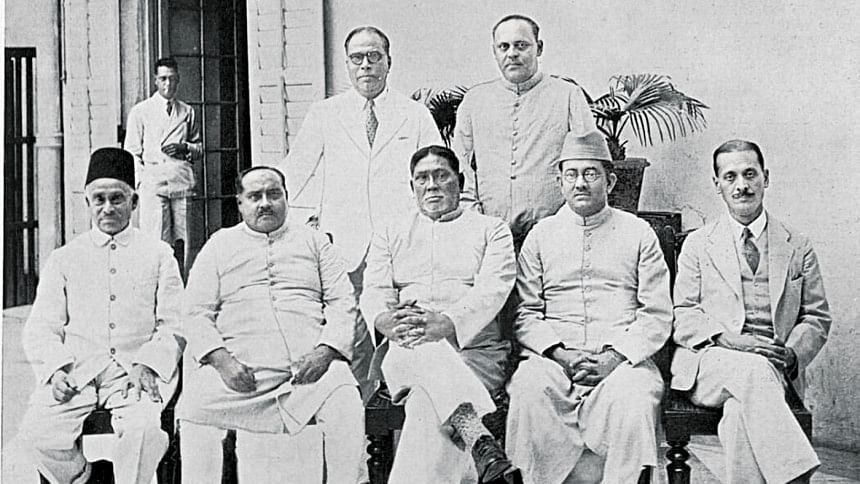
Sher-e-Bangla was an institution rather than an individual. So say his critics as well as his admirers. And rightly so. But it seems very few have really appreciated the deeper significance of the epithet given him by themselves. It appears that many regard him as an institution just in a conventional way. They do so because his colourful personality, his phenomenally eventful life, his apparently conflicting ideologies, his incomprehensible contradictions, his bold and unapologetic inconsistencies, his recklessly magnificent obsession of secret munificence, his monumental successes interspersed by abysmal failures, his childish mistakes in the context of his prodigiously sharp intellect, in short, the ocean-like expanse of his stormy life full of gems and jewels on the one hand and mud and dirt on the other, could not be explained except on the theory of an institution. But their assessment of Fazlul Huq's life, otherwise quite correct, appears to have overlooked two very important traits of his character viz: One, his confident and unfaltering insistence that in all his quarrels it was his opponents who were mistaken and not he; two, his candid confession that he never tried to be the master of his fate but allowed chance to play her part in his life. This is very significant. Indeed in my view these two traits taken together is the key to the secret chamber of Fazlul Huq's life.
It clearly implies that Fazlul Huq was led more by intuition than by intelligence. In judging Fazlul Huq we have always talked of his being guided more by heart than by brain, more by impulse than by deliberation. But we have never thought of intuition. An intuition is no mere instinct or impulse. It is that esoteric channel through which men can approach the portals of truth or rather truth may glint in men's mind in flashes. Most of Fazlul Huq's uncommon and eccentric behaviour referred to above become crystal clear if seen through this prism light or intuition. Thus interpreted Fazlul Huq's life can only mean that he was destined to fulfil a mission. At least he felt he was. It was his intuition, and he believed in it.
On his recovery from a death illness in 1935 he solemnly asserted: 'The fact of my miraculous recovery from such mortal disease indicates that Allah wishes me to fulfil a noble mission.' He may have expressly said so on that occasion but in reality he must have started feeling it decades earlier. He might not himself have any clear idea as to what that noble mission was. Most probably he had not. His mind at that time might have been too much engrossed in his quarrel with the Congress over the Mayoralty of Calcutta Corporation and of his dual with Governor Anderson over the latter's nominee Sir Nazimuddin whom he was to fight at Patuakhali for any such spiritual evaluation. These two events in and by themselves were no doubt great events serving as turning points in the political history of Bengal, but compared to Fazlul Huq's life's mission even these events pale into insignificance.
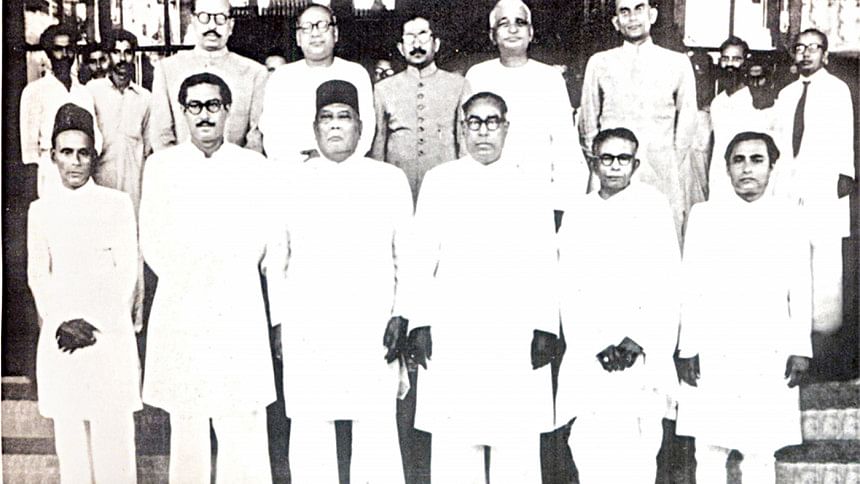
What was the mission?
But what was that mission? A little reflection on the salient traits of Fazlul Huq as a public man will supply the answer. Let us see what those traits were. To the Muslim Intelligentsia he was the champion of all round renaissance of Muslim Bengal. To the educationist he was the patron saint of education in Bengal second only to his teacher Sir Ashutosh Mukherjee. To the Hindu intelligentsia he was the most beloved of the Muslim leaders in spite of the fact that amongst the latter Fazlul Huq was the most ruthlessly outspoken in his attacks against the Caste Hindus. To Dr. Sir P.C. Roy, the great scientist-philosopher, who typified a catholic Hindu mind with broad outlook, Fazlul Huq combined in himself a true Muslim and a true Bengalee and thus constituted and ideal Bengalee of the future. To the teeming and starving millions of the peasant Bengal he was the Messiah of their Dal-bhat. Last of all he was Sher-e-Bangla, the people's lion of Bengal, in spite of or rather because of, the various esteems he was held in by their cross sections. On the whole, he belonged to the people and the people belonged to him. This has been very succinctly epitomized in the aphorism that Fazlul Huq was Bengal and Bengal was Fazlul Huq. The one really belonged to the other. To Fazlul Huq the people was not a vague term to be interpreted according to political exigencies. To him it was the peasantry, the common man, of Bengal.
So, if democracy could be defined by Abraham Lincoln as 'the government of the people, for the people and by the people', we can as well describe Fazlul Huq as the 'Sher-e-Bangla of the common man for the common man and by the common man.'
Many a politician has spoken and written democratically, but no one has lived democratically as Fazlul Huq has done. Many a statesman has spoken and written of the common man, but no one has lived like a common man in the midst of the common man as Fazlul Huq has done. The one trait of his character which has completely identified him with the common man was the ups and downs, lights and shades, the sun and the rain of his own life. In the case of the common man this instability in life was entirely to the social and economic inequities which he had been suffering. But what about Fazlul Huq? If he wanted, he could have led a successful and happy career and got at the top in any sphere of life, as success and happiness are understood by an average wise man, and thereby could have lived in a station far above the common man. But he seemed not only not to have wanted such a life but to have deliberately avoided it. If he so wanted he could, much earlier in his life, have adorned all the high offices he ultimately occupied in the ripe old age when he could and should have retired from an active life and led a peaceful one. But he did not. He would not accept anything unless it was a gift from the common man. To him no office was attractive enough to separate him from his people. And he did not want to lead a peaceful life. Peace seemed to be the last thing he wanted. If normal political life meant peace he would prefer an abnormal one. In all disputes he was the aggressor. He quarrelled with the Congress at a time when it was the most influential political party in the country and left it. He quarrelled with Governors and left ministership. He quarrelled with Quaid-e-Azam and left the Muslim League after he himself made it the most powerful party in the country.
So it was always the stronger party that he picked up to quarrel with and never with the weaker.
In all these quarrels, however, he claimed to be in the right and his opponents in the wrong. It was in these quarrels again "if he was ever sorry for what he had done, he was far more remorseful for what he had left undone."
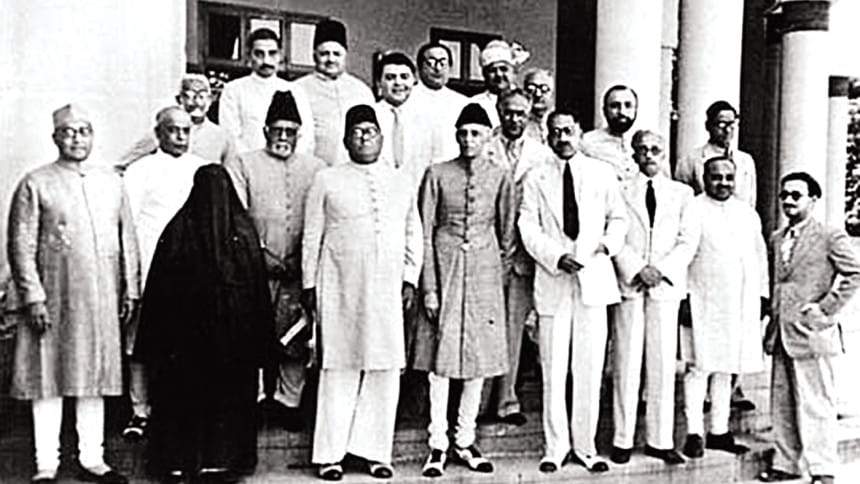
Search for a national soul
Now, if we examine these traits and the popular appellations attached thereto in the context of the respective events and quarrels which brought them into play, the following deductions follow:
Fazlul Huq was possessed with a restless soul. This restlessness was due to his search for a national soul.
Fazlul Huq's concept of this national soul passed through different, various and even contradictory formative stages. A national soul has all the elements of an individual one. If an individual soul is not just a philosopher's dream, neither is the national soul a dream of the statesman. It is a reality.
Like an individual a nation has a self. This self is not just a behaviourism. It cannot merely be objective. It must be subjective also. For a Bengalee Muslim of Fazlul Huq's time it was extremely difficult to find such a subjective feeling of a national identity, not to speak of a national soul. The very idea of nationhood throughout the world had already been passing through a revolutionary transformation as a result of the French and American revolutions. Indian Muslims in general and Muslims of Bengal in particular, were groping in darkness as to what their future and national identity would be. All chances of their revival had been dashed to pieces in consequence of the abortive war of independence miscalled Wahabi Movement and Sepoy Mutiny. Now the only question was that of survival. Thus the entire Muslim India was bleeding. This bleeding was the profusest in Bengal because in no other province of British India were the Muslims so ruthlessly denuded of all semblance of life, liberty, and culture as in Bengal by systematic brutal, unjust and illegal maltreatment meted out to the ex-rulers by the new ones.
Just imagine a people who only about a century ago were the enlightened rulers of the country not as foreigners but as those belonging to the country: the people who only 50 years ago were the teachers of the people in the arts and literature not only in the language of state but also in the language of the people, were, now, in the course of only fifty years, reduced to an illiterate mob passing their wretched life in the hovels of destitution. Imagine also the cruelty of the revengeful rulers who had been inflicting wounds after wounds on the bleeding heart of the Muslim Bengal by successive illegal steps and measures like Resumption Policy and the Permanent Settlement. Lastly, imagine the heartless addition of insult to injury by creating new Muslim province of Eastern Bengal and Assam with Dacca as its capital in belated recognition of the enormity of the treacherous breach of faith with the Muslim Bengal and then most unceremonioulsy annulling it within five years of its inauguration. This was in 1911. This event coincided with Italy's aggression on Tripoli. The Balkans were soon snatched away from Turkish hands. Iran and Afghanistan were virtually occupied by Britain and Russia.
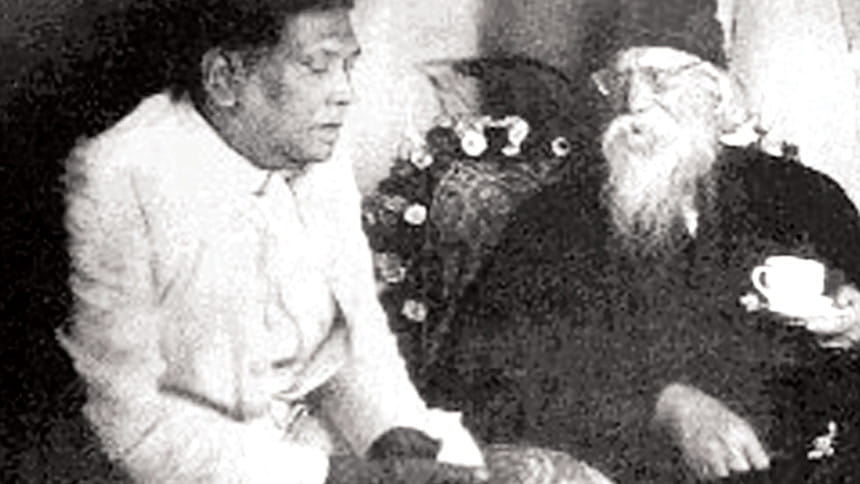
Now by the end of the First World War the subjugation of almost all the Muslim countries by the Christian powers of Europe under the leadership of Great Britain was complete. The Indian Muslims were, therefore, convinced that the anti-Muslim attitude of the British Government in India was not an isolated affair but an integral part of their global and imperial policy. This realisation on the part of the Muslims was responsible for all their subsequent political activities based and to be based on the Hindu-Muslim understanding including Lucknow Pact, Khilafat and Non-cooperation movements, Jinnah's 14-points, boycott of Simon Commission and Round Table Conference, culminating in the Communal Award. All these were undoubtedly attempts to maintain the separate identity and national soul of Muslim India from extinction by merger with the vast ocean of an All-India soul, the soul of Viswa-Bharati of Rabindranath's conception. Fazlul Huq was prominently in the thick of all these movements and parleys. Almost all the prominent Muslim leaders of Bengal participated in them in one form or another at one time or another.
The callous indifference to the annulment of the Muslim province of Eastern Bengal and Assam and their agreement in the Lucknow Pact to the permanent reduction of the Muslims of Bengal to a minority by other Muslims in exchange of weightage of a few Muslims seats in other provinces disillusioned him. It must have pained Fazlul Huq that all-India Muslim leadership did not raise its little finger of protest when Deshbandu's Bengal Pact was turned down by Indian Congress during his life time and rescinded by the Bengal Congress after his death. Fazlul Huq, therefore, never completely merged his Bengal politics in all-India affairs. Be he in the Congress, Khilafat or in the Muslim League he would never give up his Praja movement in Bengal. To Fazlul Huq there was nothing wrong or inconsistent in his simultaneously heading both the Praja Party and the Muslim League of Bengal. To him the peasantry and the Muslims of Bengal were identical. More than that.
In Fazlul Huq's view the spirit of Islam was inherent in the soil of Bengal. The religion of Islam was a levelling energy in the social plane. Just so the soil of Bengal was a levelling force in the terrestrial plane.
There is no nobility and aristocracy in Islam. There is no Fort and Castle in Bengal either. It was in this grand conception of the soul of Bengal that Fazlul Huq's own soul yearned to realise itself. It was, therefore, only natural that Fazlul Huq never agreed to any political plan by which the national soul of Bengal would be sacrificed at the altar of any bigger soul of India either divided or undivided. Indeed his persistent reluctance to enter all-India politics clearly showed that Fazlul Huq never believed in anything all-India. It was also very clear to him that if there was no one-India there could not be a one-Muslim-India either. All his quarrels with all-India leadership whether Muslim or Hindu were due to this.
The Lahore Resolution
Fazlul Huq's life's dream seemed to have attained fruition in the historic Lahore Resolution which he himself moved and in which the soul of Bengal of Fazlul Huq's conception was not only recognised but also fully enshrined in a concrete shape. He was demonstratively the happiest man at that time.
But his happiness was only transitory. The Lahore Resolution, his pet child in which independent Bengal of his life-long dream was enshrined, very soon started being distorted and disfigured in the course of tumultous and misdirected propaganda for Pakistan. He could clearly visualize the ultimate result. He could see that official propaganda of the Muslim League was bound to end in the ultimate partition of Bengal producing a truncated East Pakistan to be ruled by Western Muslim Marwaris from a distant foreign land like the Punjab. He resolutely stood up against such catastrophe. Sher-e-Bangla started protesting to, quarrelling with and writing letters, including open letters, to Quaid-i-Azam and ultimately quitted the Muslim League. As a last resort to save Bengal from being divided he formed a Progressive Coalition ministry excluding the Muslim League but inclusive of all the Parties including Congress and Hindu Sabha. But then it was too late to save Bengal as the Hindu, themselves, in the meantime, had decided to partition it. There ended Sher-e-Bengla's search for a national soul in the undivided Bengal.
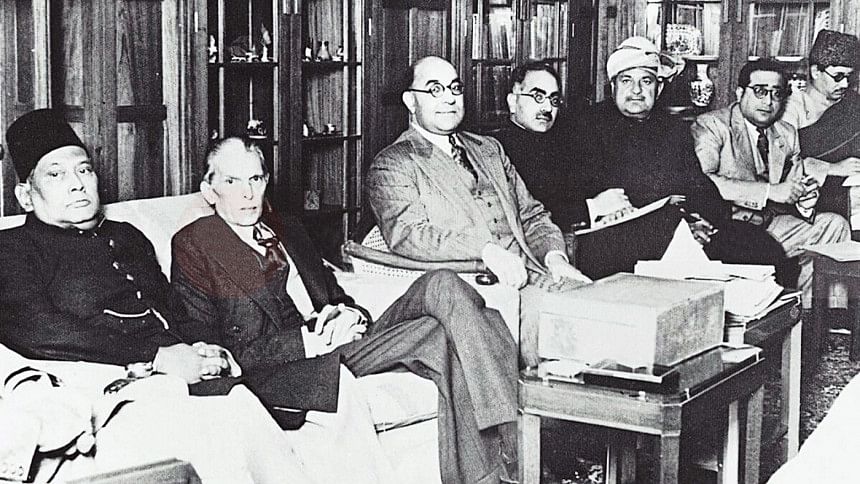
But did his search for a national soul end there? It definitely did not. The defeated Lion of Bengal spent some time in licking his wounds; but did not meet 'his Waterloo.' He resumed his pilgrim's journey in search of his ideal in which he had immense faith. His failure did not make him wise. To him to be wise was not the only wisdom. It was impossible for him to close his eyes on the inward vision of the soul of his nation. So it was chance again that impelled him to continue its search. If undivided Bengal did not prove to be the reservoir of that soul, East Bengal, which was the real Bengal, certainly would. So he began the search with renewed energy and vigour. In the Language Movement, spear-headed by the students and youths, he found the spark of that soul. It ignited the fire. The Lion roared again. It resoundingly reverberated. The echo came from the core of the heart of the masses. It shook the earth. The Lion's Bengal appeared to have assumed a national identity and a spiritual personality. It seemed Sher-e-Bangla's dream was about to be fulfilled.
But no! It was only a false dawn, a Subeh Kazeb, not a Subeh Sadeq! The light receded. The darkness thickened! Storms raged. Fazlul Huq was again disappointed. But "these disappointments did not cure him" of his hunger for a national soul which he modestly called his "ineradicable romanticism." This was so because he "never tried to make himself the complete master of his fate." He intuitively knew that it was not his individual fate that he was striving for. It was the fate of a nation. Intensely religious, Fazlul Huq believed in the immutability of the destiny any immortality of the soul of his people as well as his own. He, therefore, continued upto the end, to "let him be up and doing with a heart for any fate, still achieving still pursuing." He did "learn to labour and to wait".
Thus the great pilgrim died in the midst of his quest for the soul of his nation. His old body fell, but not his young heart. His hands dropped, but not the unextinguishable lamp they held. The restless soul that for half a century yearned to fulfil itself in a national identity and could not do so during his lifetime is, still, after his death, beckoning his people from a way side grave to go on with the quest. The fact that this he is doing from the precincts of the High Court of Judicature of the realm and that his two great comrades have joined him there, is symbolic of the sign—justice and his erstwhile comrades are on his side.
Will the new generation fail him and the nation?
Abul Mansur Ahmad (September 3, 1898-March 18, 1979) was an eminent litterateur, journalist and politician.
The article was originally published in The Observer on April 27, 1966.

 For all latest news, follow The Daily Star's Google News channel.
For all latest news, follow The Daily Star's Google News channel. 


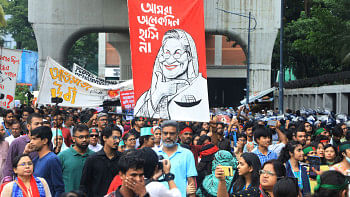
Comments